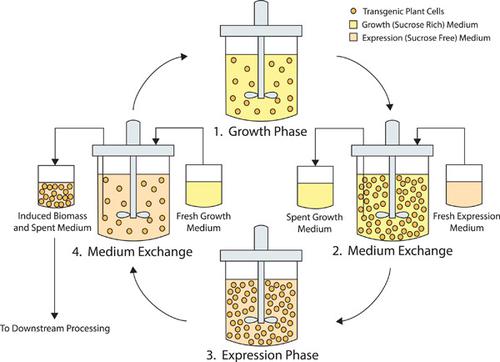当前位置:
X-MOL 学术
›
Biotechnol. Bioeng.
›
论文详情
Our official English website, www.x-mol.net, welcomes your feedback! (Note: you will need to create a separate account there.)
Technoeconomic analysis of semicontinuous bioreactor production of biopharmaceuticals in transgenic rice cell suspension cultures.
Biotechnology and Bioengineering ( IF 3.8 ) Pub Date : 2020-06-27 , DOI: 10.1002/bit.27475 Jasmine M Corbin 1 , Matthew J McNulty 1 , Kantharakorn Macharoen 1 , Karen A McDonald 1, 2 , Somen Nandi 1, 2
Biotechnology and Bioengineering ( IF 3.8 ) Pub Date : 2020-06-27 , DOI: 10.1002/bit.27475 Jasmine M Corbin 1 , Matthew J McNulty 1 , Kantharakorn Macharoen 1 , Karen A McDonald 1, 2 , Somen Nandi 1, 2
Affiliation

|
Biopharmaceutical protein production using transgenic plant cell bioreactor processes offers advantages over microbial and mammalian cell culture platforms in its ability to produce complex biologics with simple chemically defined media and reduced biosafety concerns. A disadvantage of plant cells from a traditional batch bioprocessing perspective is their slow growth rate which has motivated us to develop semicontinuous and/or perfusion processes. Although the economic benefits of plant cell culture bioprocesses are often mentioned in the literature, to our knowledge no rigorous technoeconomic models or analyses have been published. Here we present technoeconomic models in SuperPro Designer® for the large‐scale production of recombinant butyrylcholinesterase (BChE), a prophylactic/therapeutic bioscavenger against organophosphate nerve agent poisoning, in inducible transgenic rice cell suspension cultures. The base facility designed to produce 25 kg BChE per year utilizing two‐stage semicontinuous bioreactor operation manufactures a single 400 mg dose of BChE for $263. Semicontinuous operation scenarios result in 4–11% reduction over traditional two‐stage batch operation scenarios. In addition to providing a simulation tool that will be useful to the plant‐made pharmaceutical community, the model also provides a computational framework that can be used for other semicontinuous or batch bioreactor‐based processes.
中文翻译:

转基因水稻细胞悬浮培养中生物药物半连续生物反应器生产的技术经济分析。
与微生物和哺乳动物细胞培养平台相比,使用转基因植物细胞生物反应器工艺生产生物制药蛋白的优势在于,它能够使用简单的化学成分确定的培养基生产复杂的生物制剂,并减少生物安全问题。从传统的批量生物处理的角度来看,植物细胞的一个缺点是它们的缓慢生长速度,这促使我们开发半连续和/或灌注过程。尽管文献中经常提到植物细胞培养生物过程的经济效益,但据我们所知,尚未发表严格的技术经济模型或分析。在这里,我们展示了 SuperPro Designer® 中用于大规模生产重组丁酰胆碱酯酶 (BChE) 的技术经济模型,在诱导型转基因水稻细胞悬浮培养物中,一种预防/治疗性生物清除剂,可预防有机磷酸盐神经毒剂中毒。该基地设施旨在利用两阶段半连续生物反应器操作每年生产 25 公斤 BChE,以 263 美元的价格生产单剂 400 毫克 BChE。半连续操作场景比传统的两阶段批量操作场景减少 4-11%。除了提供对植物制药界有用的模拟工具外,该模型还提供了一个计算框架,可用于其他基于半连续或批量生物反应器的过程。该基地设施旨在利用两阶段半连续生物反应器操作每年生产 25 公斤 BChE,以 263 美元的价格生产单剂 400 毫克 BChE。半连续操作场景比传统的两阶段批量操作场景减少 4-11%。除了提供对植物制药界有用的模拟工具外,该模型还提供了一个计算框架,可用于其他基于半连续或批量生物反应器的过程。该基地设施旨在利用两阶段半连续生物反应器操作每年生产 25 公斤 BChE,以 263 美元的价格生产单剂 400 毫克 BChE。半连续操作场景比传统的两阶段批量操作场景减少 4-11%。除了提供对植物制药界有用的模拟工具外,该模型还提供了一个计算框架,可用于其他基于半连续或批量生物反应器的过程。
更新日期:2020-06-27
中文翻译:

转基因水稻细胞悬浮培养中生物药物半连续生物反应器生产的技术经济分析。
与微生物和哺乳动物细胞培养平台相比,使用转基因植物细胞生物反应器工艺生产生物制药蛋白的优势在于,它能够使用简单的化学成分确定的培养基生产复杂的生物制剂,并减少生物安全问题。从传统的批量生物处理的角度来看,植物细胞的一个缺点是它们的缓慢生长速度,这促使我们开发半连续和/或灌注过程。尽管文献中经常提到植物细胞培养生物过程的经济效益,但据我们所知,尚未发表严格的技术经济模型或分析。在这里,我们展示了 SuperPro Designer® 中用于大规模生产重组丁酰胆碱酯酶 (BChE) 的技术经济模型,在诱导型转基因水稻细胞悬浮培养物中,一种预防/治疗性生物清除剂,可预防有机磷酸盐神经毒剂中毒。该基地设施旨在利用两阶段半连续生物反应器操作每年生产 25 公斤 BChE,以 263 美元的价格生产单剂 400 毫克 BChE。半连续操作场景比传统的两阶段批量操作场景减少 4-11%。除了提供对植物制药界有用的模拟工具外,该模型还提供了一个计算框架,可用于其他基于半连续或批量生物反应器的过程。该基地设施旨在利用两阶段半连续生物反应器操作每年生产 25 公斤 BChE,以 263 美元的价格生产单剂 400 毫克 BChE。半连续操作场景比传统的两阶段批量操作场景减少 4-11%。除了提供对植物制药界有用的模拟工具外,该模型还提供了一个计算框架,可用于其他基于半连续或批量生物反应器的过程。该基地设施旨在利用两阶段半连续生物反应器操作每年生产 25 公斤 BChE,以 263 美元的价格生产单剂 400 毫克 BChE。半连续操作场景比传统的两阶段批量操作场景减少 4-11%。除了提供对植物制药界有用的模拟工具外,该模型还提供了一个计算框架,可用于其他基于半连续或批量生物反应器的过程。


























 京公网安备 11010802027423号
京公网安备 11010802027423号